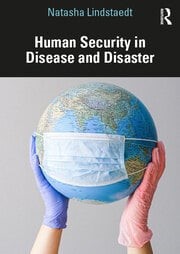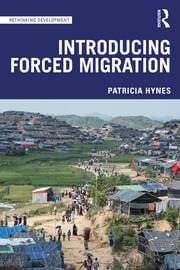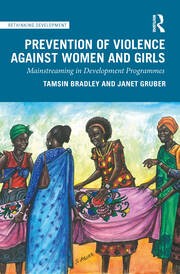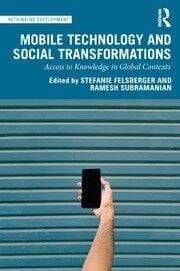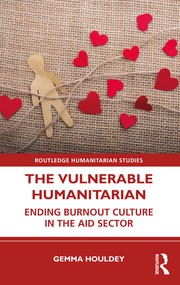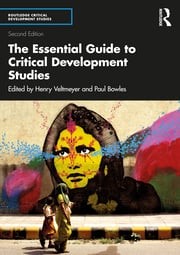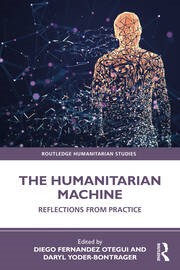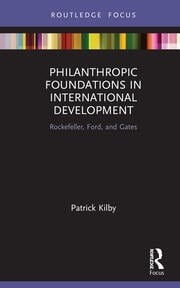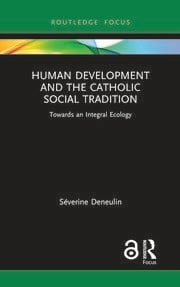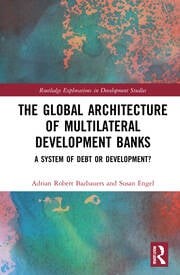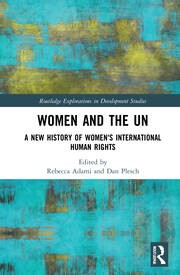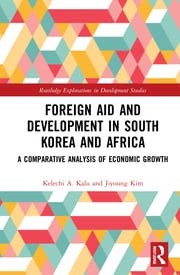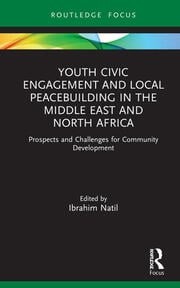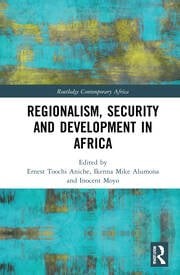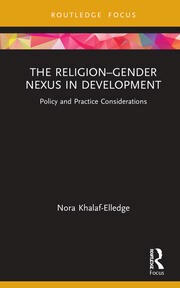Routledge latest publications – November
You can browse Routledge’s full collection of Global Development titles here. Lecturers can get free inspection copies of all our teaching materials. Please also see our very latest published titles from the last couple of monthsprofiledbelow.
Interested in publishing with us? Contact our Global Development editor Helena Hurd at [email protected]
Human Security in Disease and Disaster
Natasha Lindstaedt
This timely new textbook lays bare the ways in which disease and disaster can turn politicians into global leaders or national liabilities. It explains the impact of crises on development and human security and explores how states and societies can respond more effectively.
In the wake of Covid-19, this introductory textbook is perfect for undergraduate and masters courses exploring the expanding politics and human security issues surrounding disease and disasters. It will also be of interest to think tanks and policy communities looking for fresh insights to bring into professional practice.
Introducing Forced Migration
Patricia Hynes
“an eclectic and extremely accessible exploration of this widely deployed but complex concept. […] the book provides a comprehensive foundational understanding of forced migration, constituting a valuable resource for scholars, students and informed laypeople.” – Roger Zetter, Professor Emeritus in Refugee Studies, Refugee Studies Centre, University of Oxford, UK
“If you want a comprehensive resource on forced migration, Introducing Forced Migration is the textbook for you. Hynes offers critical definitions and policy perspectives that cover topics from the distinctions between refugees and asylum-seekers to human trafficking and displaced children. This book helpfully takes the reader through concepts and complexities of some of the most pressing migration concerns of today” – Cathy Zimmerman, Professor Migration, Violence and Health, London School of Hygiene & Tropical Medicine, UK
” a first-rate introduction to the subject of forced migration. […] I would recommend the book to anyone wanting to understand one of the most important issues of our times.” — B.S.Chimni, Distinguished Professor of International Law, O.P. Jindal Global University, India
Prevention of Violence Against Women and Girls: Mainstreaming in Development Programmes
Tamsin Bradley and Janet Gruber
“This is a ground-breaking book that challenges the VAWG prevention and response orthodoxy. Evidence from the online-surveys, field work and document reviews are used to build a VAWG Prevention and Response Framework that can be adapted and applied across sectors, in both development and humanitarian emergency contexts. Case studies from across the world provide detailed examples of what works, focusing too on what does not and the blinkered gender-blind approaches that are too often applied.” — Maureen Leah Chirwa, Health Systems Research and Management Specialist, founder of a woman established research firm, Prime Health Consulting and Services in Malawi
Mobile Technology and Social Transformations: Access to Knowledge in Global Contexts
Tamsin Bradley and Janet Gruber
This book investigates the ways in which the mobile telephone has transformed societies around the world, bringing both opportunities and challenges. At a time when knowledge and truth are increasingly contested, the book asks how mobile technology has changed the ways in which people create, disseminate, and access knowledge.
With case studies from Hong Kong, South Korea, India, Syria, Egypt, Botswana, Brazil, and the US, this book provides an important account of the changing nature of our access to knowledge, and is key reading for students, researchers, activists and policy makers with an interest in technology and access to knowledge, communication, social transformation, and global development.
“A fascinating overview of the pathology of international aid as we do it today. Gemma’s book is particularly valuable for its distinct understanding of national and international humanitarians, and for the organizational policies and therapies she suggests to help aid workers be better, and so feel better too.” – Dr Hugo Slim, Las Casas Institute for Social Justice, Blackfriars Hall, University of Oxford and formerly Head of Policy at the International Committee of the Red Cross.
“Perhaps a book 70 years in its making, it is heartfelt to know that the self-reflection of aid workers and the unmet power of their emotional needs can be examined. Not only the physical toll or emotional labour of this work, but also the need to address privilege within a global context of mental health justice, is an urgency for us all.” – Atif Choudhury, Co-founder and CEO of Diversity and Ability (D&A) and Zaytoun CiC
The Politics of Knowledge in Inclusive Development and Innovation
Edited By David Ludwig, Birgit Boogaard, Phil Macnaghten, and Cees Leeuwis
“Development pathways are plural and political, as is the knowledge that shapes and contributes to them. Not shirking from the real difficulties and conundra of including diverse perspectives amidst complex dynamics, and deftly weaving theory and practice through a host of real-world examples, this volume helps chart the way. A thoughtful and robust contribution to the burgeoning literature on knowledge in/for development that contests some of its most treasured assumptions.” – Melissa Leach, Director of the Institute of Development Studies (IDS) at the University of Sussex, UK
“Knowledge is not universal and neither are the processes of its generation and application neutral. This book inspires reconstruction of valid knowledge for and rethinking the concept of inclusive development.” – Paul Kibwika, Department of Extension and Innovation Studies, Makerere University, Uganda
Understanding Global Poverty: Causes, Solutions, and Capabilities
Serena Cosgrove and Benjamin Curtis
“This exceptional cross-disciplinary and cross-cultural work on one of the most pressing issues of humanity must be read not only by scholars and university students but also by policy makers. The authors show vividly and compassionately how poverty is a human problem and how it is related to capabilities. This book hands a mirror to its readers.” – Gül İnanç, Co-Director, Centre for Asia Pacific Refugee Studies, University of Auckland
“This smartly revised second edition of Understanding Global Poverty is an exemplary go-to resource. Each chapter’s clearly articulated learning goals and discussion questions are ideal for the student-centered classroom. While unapologetically grounded in ethical approaches to development, the authors nevertheless consider both the strengths and weaknesses of each using empirical evidence and vignettes to illustrate core concepts and debates. Its multi-disciplinarity will attract a wide variety of students eager to understand the challenges of global poverty and engage in solutions to meet them.” – Daniel J. Whelan, Bill and Connie Bowen Odyssey Professor of Politics, Hendrix College, USA
The Essential Guide to Critical Development Studies
Edited By Henry Veltmeyer and Paul Bowles
”In this updated and expanded edition across over forty chapters, this volume is the “go to” source for scholars and students of critical development studies. It provides the highest levels of scholarship and knowledge around the history, content and scope of the field with relevance for challenging and posing contemporary policy and activism.” – Ben Fine, Emeritus Professor, School of Oriental and African Studies (SOAS), University of London, UK
“Given the aspirations for social, economic and climate justice, the need for critical, interdisciplinary knowledge that points us toward bold alternatives has never been greater. This Essential Guide offers an invaluable resource in this regard. Its chronicling of the trajectory of development studies will be particularly useful to contemporary scholars to see their ideas in a historical context.” – Ananya Mukherjee Reed, Professor, Department of Economics, Philosophy and Political Science, University of British Columbia Okanagan, Canada; Co-editor, Canadian Journal of Development Studies
The Humanitarian Machine: Reflections from Practice
Edited By Diego Fernandez Otegui and Daryl Yoder-Bontrager
“We have long awaited The Humanitarian Machine. Here it is with all the misgivings, dilemmas, contradictions and rewards that such lives consist of. Read and cherish these experiences because they reflect a truth and humanity that screams from the pages.” – Phil O’Keefe, Professor, Northumbria University, UK
“This book not only provides the lessons, above all, it encourages us to tackle the flaws in the humanitarian machine. This is a must read for humanitarians.” – Emeritus Professor Barry Munslow, Liverpool School of Tropical Medicine, UK
“A refreshing and fascinating study of the power, politics and influence of global foundations on international development policy and practice. From the Gates Foundation to the Al Waleed philanthropies of Saudia Arabia, Kilby skilfully unravels the implications for global stability and change in a post-Covid world. A `must read’ for development studies, international relations, politics and public health researchers.” — Jude Howell, Professor of International Development, LSE, UK
“Love or loathe them, the influence of massively wealthy foundations set up by wealthy entrepreneurs has had a profound effect on development affairs. This highly readable account provides an important introduction to some of the oldest and largest foundations, and explores the context in which the newer arrivals will wield their influence.” — Dan Brockington, Professor and Director of SIID, University
“This is a hugely valuable text that looks at a real opportunity to take development thinking and action forward through a dialogue between human development and the Catholic social tradition.” — Simon McGrath, UNESCO Chair in International Education and Development; and Professor, School of Education, University of Nottingham, UK
“This book brilliantly transposes the thinking of Nobel-prize winning economist, Amartya Sen, with the theology of the Catholic Church on objectives of development, conditions needed for human flourishing, and the place of human beings in the natural world. […]” — Frances Stewart, Professor Emeritus of Development Economics, University of Oxford, UK
The Global Architecture of Multilateral Development Banks: A System of Debt or Development?
Adrian Robert Bazbauers and Susan Engel
“In this comprehensive and opportune book, Bazbauers and Engel approach the multilateral development banks from the perspective that collectively they constitute a system of development institutions. […] As someone who has written on the development banks since the 1990s, this is the most important work on the MDBs I have read in years.” — Jonathan R. Strand, Professor of Political Science, University of Nevada Las Vegas, USA
“The key contribution of this path-breaking work by Adrian Bazbauers and Susan Engel lies in it approaching the world’s 30 MDB’s as essentially parts of a system.” — Walden Bello, Adjunct Professor of Sociology, State University of New York at Binghamton and co-founder, Focus on the Global South
Women and the UN: A New History of Women’s International Human Rights (OPEN ACCESS)
Edited By Rebecca Adami and Dan Plesch
This book provides a critical history of influential women in the United Nations and seeks to inspire empowerment with role models from bygone eras. The women whose voices this book presents helped shape UN conventions, declarations, and policies with relevance to the international human rights of women throughout the world today. In view of contemporary feminist and postmodern critiques of the origin of human rights, uncovering women’s history of the United Nations from both Southern and Western perspectives allows us to consider questions of feminism and agency in international relations afresh. Women and the UN will appeal to anyone whose research covers human rights, gender equality, international development, or the history of civil society.
Foreign Aid and Development in South Korea and Africa: A Comparative Analysis of Economic Growth
By Kelechi A. Kalu and Jiyoung Kim
This book compares the rapid development of South Korea over the past 70 years with selected countries in sub-Saharan Africa to assess what factors contributed to the country’s success story, and why it is that countries that were comparable in the past continue to experience challenges in achieving and sustaining economic growth.
In the 1950s, South Korea’s GDP per capita was $876, roughly comparable with that of Cote d’Ivoire and somewhat below Ghana’s. The country’s subsequent transformation from a war-ravaged, international aid-dependent economy to the 13th largest economy in the world has been the focus of considerable international admiration and attention. But how was it that South Korea succeeded in multiplying its GDP per capita by a factor of 23, while other Less Developed Countries continue to experience challenges?
Youth Civic Engagement and Local Peacebuilding in the Middle East and North Africa: Prospects and Challenges for Community Development
Edited By Ibrahim Natil
This book investigates the ways in which young people engage with and contribute to civil society, community development, and local peacebuilding in the Middle East and North Africa (MENA).
The insights drawn from this interdisciplinary collection will be of interest to researchers of civil society, youth, peacebuilding, and development, as well as to policymakers, donors, and NGO staff.
Regionalism, Security and Development in Africa
Edited By Ernest Toochi Aniche, Ikenna Mike Alumona and Inocent Moyo
This book charts the history and contemporary landscape of African regionalism, investigating how regional cooperation can be used to help to tackle security and development challenges in Africa.
This ambitious and broad-ranging book will be a valuable resource for researchers working on African regionalism, security, African integration and development, and comparative regionalism. Policymakers should also consider it a useful guide to the background and contemporary landscape of African regionalism.
The Religion–Gender Nexus in Development: Policy and Practice Considerations
Nora Khalaf-Elledge
This book illuminates the intersection of religion and gender within the development sector, exposing challenges in both policy and practice and suggesting implementable solutions.
Bridging the gap between academic theory and day-to-day development practice, this book is an important reference for development practitioners, and for researchers from across development studies, gender studies, and religious studies.

